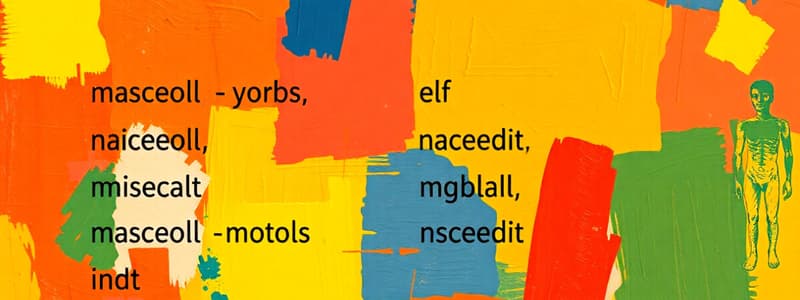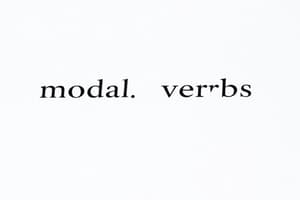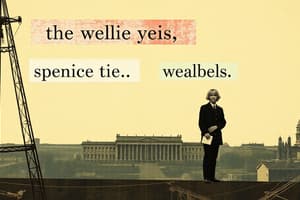Podcast
Questions and Answers
Which modal verb is typically used to express the strongest assumptions about a future event?
Which modal verb is typically used to express the strongest assumptions about a future event?
- Should
- Will (correct)
- Could
- May
The modal verb 'could' can be appropriately used in one-time voluntary positive sentences in place of 'can'.
The modal verb 'could' can be appropriately used in one-time voluntary positive sentences in place of 'can'.
False (B)
Which modal verb is used to express an action in the future, typically used to ask a question or make suggestion and is used only with 'I' and 'We'?
Which modal verb is used to express an action in the future, typically used to ask a question or make suggestion and is used only with 'I' and 'We'?
Shall
The modal verb '_____' is used to indicate possibility in the future, present and past.
The modal verb '_____' is used to indicate possibility in the future, present and past.
Match the modal verbs with their primary functions:
Match the modal verbs with their primary functions:
Which of the following modal verbs is used to express permission or request?
Which of the following modal verbs is used to express permission or request?
The modal verb 'won't' is used to express willingness.
The modal verb 'won't' is used to express willingness.
Which modal verb is used to suggest an action, as in 'Should we eat out?'
Which modal verb is used to suggest an action, as in 'Should we eat out?'
To indicate that someone was able to complete a task at a specific time in the past, you would use 'was/were _____ to'.
To indicate that someone was able to complete a task at a specific time in the past, you would use 'was/were _____ to'.
According to the information, which of these modal verbs indicate possibility of an event, and which one has the most likelihood out of the three?
According to the information, which of these modal verbs indicate possibility of an event, and which one has the most likelihood out of the three?
Flashcards
What does "can" express?
What does "can" express?
Indicates ability or possibility in the present tense.
What does "could" express?
What does "could" express?
Indicates ability or possibility in the past tense.
What does "was/were able to" express?
What does "was/were able to" express?
Used to express ability in the past, particularly at specific times.
What does "will" express?
What does "will" express?
Signup and view all the flashcards
What does "won't" express?
What does "won't" express?
Signup and view all the flashcards
What does "must" express?
What does "must" express?
Signup and view all the flashcards
What does "may" express?
What does "may" express?
Signup and view all the flashcards
What does "might" express?
What does "might" express?
Signup and view all the flashcards
What does "shall" express?
What does "shall" express?
Signup and view all the flashcards
What does "should" express?
What does "should" express?
Signup and view all the flashcards
Study Notes
Modals
- "Can" is used to express the present tense.
- "Could" indicates the past tense.
- "Could" cannot be used in one-time voluntary positive sentences.
- "Could" can be used in place of "would be able to".
- "Was/were able to" is used to express the past tense and in specific times.
- "Will" expresses strong assumptions, willingness, promises, and determination.
- "Won't" expresses strong assumptions as well as unwillingness, broken promises, and lack of determination.
- "Must" indicates strong assumptions or obligations, as well as logical certainty.
- "May" denotes possibility and can be used for permission or requests.
- "Might" expresses possibility in the future, present, and past.
- "Shall" is used for actions in the future, to ask a question, and to suggest, typically used with "I" and "We".
- "Should" is used to make suggestions and indicate likelihood.
- The modals "May," "Might," and "Could" all indicate the possibility of an event happening; "Could" suggests the most likelihood.
Studying That Suits You
Use AI to generate personalized quizzes and flashcards to suit your learning preferences.




